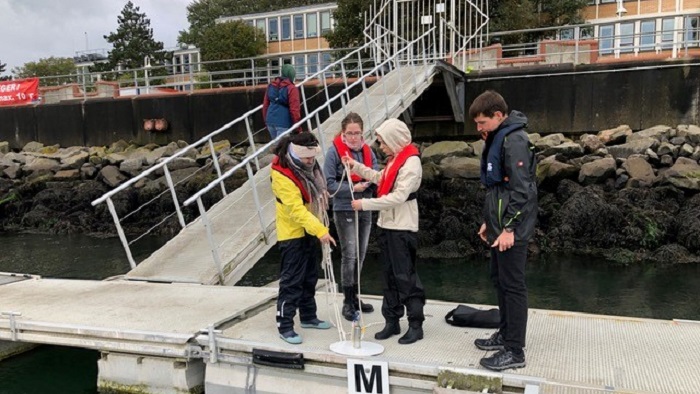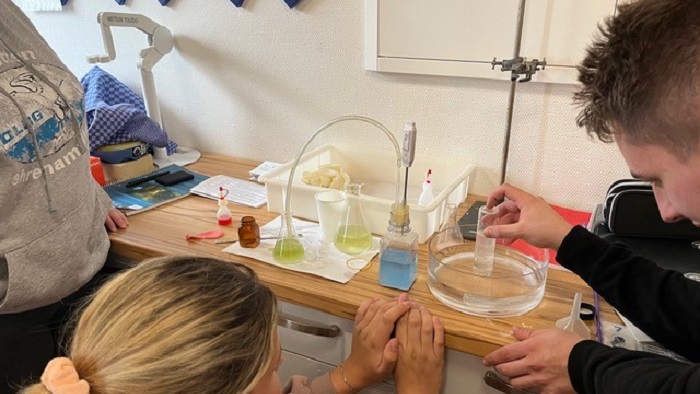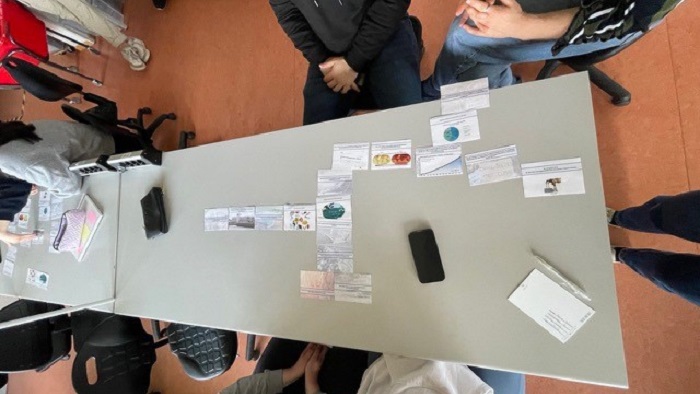Preparing the student lab
During the first week on the island, the students of the Elite Graduate Program "MINT-Lehramt PLUS" concentrated on the preparations for the school class. In the course of the preparation process, experiments and methods were developed, discarded, redeveloped and finally refined. We also gained deeper and very valuable insights into AWI research. The following days were spent sampling and collecting data in the North Harbor, where we focused on plankton and abiotic factors, such as temperature, pH, etc. We fished for plankton in different groups and measured the water depth using a Secchi disk. The collected plankton was then extensively examined under binoculars in the laboratory and a comprehensive species list was compiled.
Egg race and experiments on ocean acidification
An "egg race" on the topic of ocean acidification got the pupils in the right mood. With the help of a box of different materials, the young people were able to get creative themselves, develop their own plans and familiarize themselves with the laboratory materials available. At the same time, they were encouraged to think about the processes that lead to ocean acidification and to imitate them on a small scale.
The students were then able to deepen their understanding of ocean acidification in a more scientific way with the help of various experiments. It was particularly important for us to then place the experiments in a broader context and discuss together which processes take place at the interface between the ocean and the atmosphere. The experiments clearly showed that more alkaline seawater can absorb a greater amount of CO2 than tap and distilled water. The seawater in the ocean has a natural buffering effect due to the hydrogen carbonate and carbonate ions it contains. As a result, the pH value in seawater drops less sharply when CO2 is added than in tap water. If the above-mentioned ions are added to the seawater, this buffering effect is further enhanced. This provides an opportunity to counteract the acidification of the oceans. However, this is not a permanent solution, as the CO2 from the atmosphere caused by humans cannot be completely bound - the amount of carbonate ions required would be unrealistic. Experiments on the temperature dependence of the buffering effect have shown that the solubility of CO2 decreases with increasing water temperature. There is therefore a risk of an intensifying cycle due to the anthropogenic greenhouse effect, temperature increase and additional CO2 outgassing from the oceans
With a mystery, we wanted to give the students the opportunity to visualize the complex connections between climate change, ocean acidification, the marine ecosystem and society. Working in groups, the young people worked together to put the cards, consisting of 1-2 sentences and a picture, into a logical order. In doing so, they were able to deal with various aspects of the topic, from the causes of climate change to the effects on the oceans and the atmosphere. This type of discussion not only promoted their understanding of the topic, but also their ability to think independently and solve problems.
In a self-developed role-play in the context of education for sustainable development (ESD), the question was how Heligoland can and should become CO2-neutral. The aim of the role play was to develop a joint, binding plan that can be implemented. After a preparatory phase in which the young people were able to familiarize themselves with the interests and motives of their new roles, the actual game phase began. The pupils took part in the role play with enthusiasm and came up with sensible compromises and concrete plans, some of which are actually being discussed in the municipality of Heligoland. In the subsequent reflection phase, however, the results of the two groups were not only compared with each other, but also discussed on a meta-level about the role play and the personal experiences of immersing oneself in a different role.
Raising awareness of changes in the oceans
Our time at the OPENSEA student laboratory on Heligoland was undoubtedly an unforgettable and educational experience. In the midst of Heligoland's breathtaking nature, we not only experienced the beauty of the island, but also the importance of extracurricular places of learning at first hand. The school laboratory on Heligoland - a place of learning, research and discovery - offers a unique opportunity to raise awareness of issues related to changes in the oceans.
Text: Dr. Nicole Wolf, Marcel Emmert, Mirja Hüßler, Tobias Schmidt, Marlyn Weimer, Patrick Schmitt und Lena Adelsperger, Elite Graduate Program „MINT-Lehramt PLUS“




